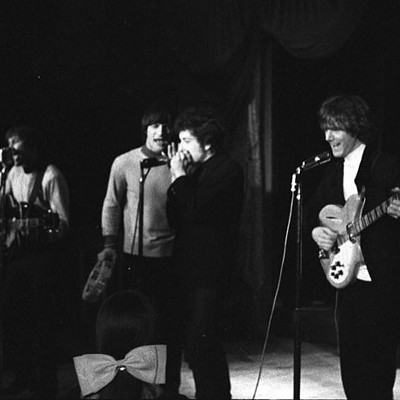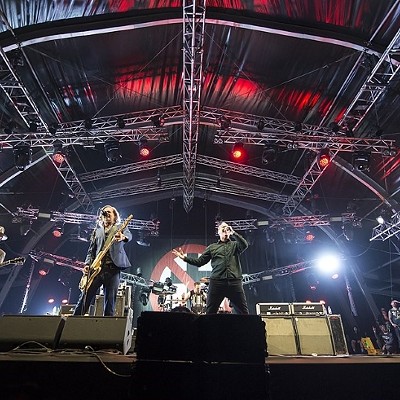News emerged late last month that the U.K. date of Sonishphere, the traveling European hard-rock festival, has been canceled. It's a pretty big blow for music fans across the pond -- the headliners scheduled for the event included Queen with Adam Lambert, KISS and Faith No More, and reunited Swedish post-hardcore outfit the Refused were supposed to make their only UK appearance in 2012 at the fest (they've since signed on for the competing Download Festival).
Sonisphere UK has been a major outpost on the European festival circuit since 2009, and its cancellation was disconcerting, to say the least. In a statement on the Sonisphere Web site, organizers released the following statement:
Putting the festival together in what is proving to be a very challenging year was more difficult than we anticipated and we have spent the last few months fighting hard to keep Sonisphere in the calendar. Unfortunately circumstances have dictated that we would be unable to run the festival to a standard that both the artists and that Sonisphere's audience would rightly expect.
That's a pretty vague explanation. Obviously, the festival wasn't selling enough tickets to appear financially feasible enough for the organizers to go through with, but why? And what are the implications of the cancelation for the music festival industry in Europe and around the world? With no concrete answers forthcoming, certain Houston music bloggers are left free to speculate.
Here are five reasons that probably contributed to Sonisphere getting the axe -- pitfalls that festival organizers closer to home, even Coachella, will have to be increasingly wary of moving forward.
5. Fuel Costs: U.K. fuel prices hit an all-time high of £1.40 ($2.20) a liter late last month -- that's over $8 a gallon. Clearly, transportation in Western Europe works a bit differently than it does in Houston, but that's pretty damn steep no matter how you slice it.
Sonisphere is a traveling festival, and Knebworth House doesn't host gigantic live-music events every day. That means many tons of stage equipment, vendor materials, portapotties, food and water, musical acts and everything else associated with putting on a massive three-day event has to be transported in. Thanks to sky-high fuel prices, that's more expensive this year than ever before.
With music festivals typically operating on razor-thin margins at the best of times, the added costs of transportation risen by soaring gas prices could have been a major contributor to putting Sonisphere U.K.'s outlook in the red for 2012.
4. Nostalgia Only Goes So Far: At big European festivals, a lot of the money comes from weekend and camping tickets, a pretty major commitment of time and cash from fans. Now let's revisit the Sonisphere: Queen with Adam Lambert, KISS and Faith No More. When was the last time any of them put out new music?
Though we here at Rocks Off would happily jump at the chance to see any of those bands, let's face facts: They're nostalgia acts, appealing more to older rock fans than the young whipper-snappers blasting dubstep in their dorm rooms .
Are the older fans that the fest was counting on to snap up camping tickets to see these bands really likely to be interested in hanging out for an entire weekend, sitting through Evanescence, Andrew W.K. and Kverlertak to see decrepit versions of '70s superstars? And how keen were the (slightly) younger fans psyched about the Refused reunion about shelling out $300 to see friggin' KISS?
Without strong ticket sales to folks looking to camp out for three days to see everything, one can see how Sonisphere might begin to resemble a massive money sink rather than a profitable endeavor.
3. The Competition is Fierce: Big as it is, Sonisphere is hardly the only game in town. The fest's two biggest British rivals -- Download and T in the Park -- announced their headliners months before Sonisphere did. That's a major head start in selling tickets at a time when most festival-goers probably aren't looking to shell out for more than one big weekend of outdoor music.
And that's not even counting the dozens of competing festivals across Europe! Oh, and don't forget that nearby London is playing host to the biggest festival of all this summer -- the Olympics. If you could only choose one British mega-event this summer, we're not sure Adam Lambert's Freddie Mercury impression tops your list of options. The fest's poorly timed lineup announcements combined with heavy-duty competition for festival dollars (er, pounds) seem likely to have helped doom Sonisphere U.K.
2. The Icarus Factor: Knebworth ain't the only place to catch a festival under the Sonisphere umbrella. When the festival series started out in 2009, it was held in six locations across Europe capped by a two-day event in Britain. The next year, Sonisphere expanded to 11 locations across Europe and then 13 in 2011, including a date in India.
That's a pretty aggressive expansion across a rather large chunk of the globe. In a clear sign that the festival may have overextended itself, organizers decided to scale back the schedule this year, planning a mere six events across Europe.
The show's rapid expansion over only three years almost certainly stretched promoter Kilimanjaro Live's bank account to the limit. With Knebworth being the only three-day event on its calendar, it stands to reason that it was also the costliest to run.
If the organizers found themselves stretched too thin financially, axing the most expensive festival on its calendar may have been the only choice that made fiscal sense--especially if ticket sales were slow.
1. It's the Economy, Stupid: News flash: The European economy kind of sucks dick at the moment. Greece and Italy are facing serious debt issues, and the Euro isn't necessarily looking like the greatest idea. The U.K. isn't immune to the pressures faced by the Eurozone, either. Promised sanctions against Iran are contributing to high gas prices, and the threat of recession is omnipresent.
Basically, people don't have a lot of extra cash lying around, and what little they do have, they're afraid to spend. Even the most dedicated music fans are thinking twice about spending money on live concerts these days, especially three-day events that cost $300. That's three days spent blowing cash instead of making it.
Sure, you're theoretically getting a lot of rock for your money, but entertainment isn't necessarily at the top of everyone's budget at the moment, even if they don't have to worry about maintaining health insurance!
So what does this all mean for the booming global festival circuit? That's far from clear, but the cancellation of Sonisphere isn't an isolated occurrence. Fests in such disparate locales as Orlando, Fla.; Taos, N.M. and Tokyo, Japan, have been called off already this year, as well. Obviously, every circumstance is different, but announcing a bunch of big-name bands and selling tickets online is no guarantee of success these days.
Plenty of major festivals all around the world are scheduled to go off without a hitch this summer, but with more and more events competing for a shrinking number of entertainment dollars, promoters in the U.S. (and right here in Houston) would do well to learn what they can from Sonisphere's mistakes and misfortune.
Follow Rocks Off on Facebook and on Twitter at @HPRocksOff.





